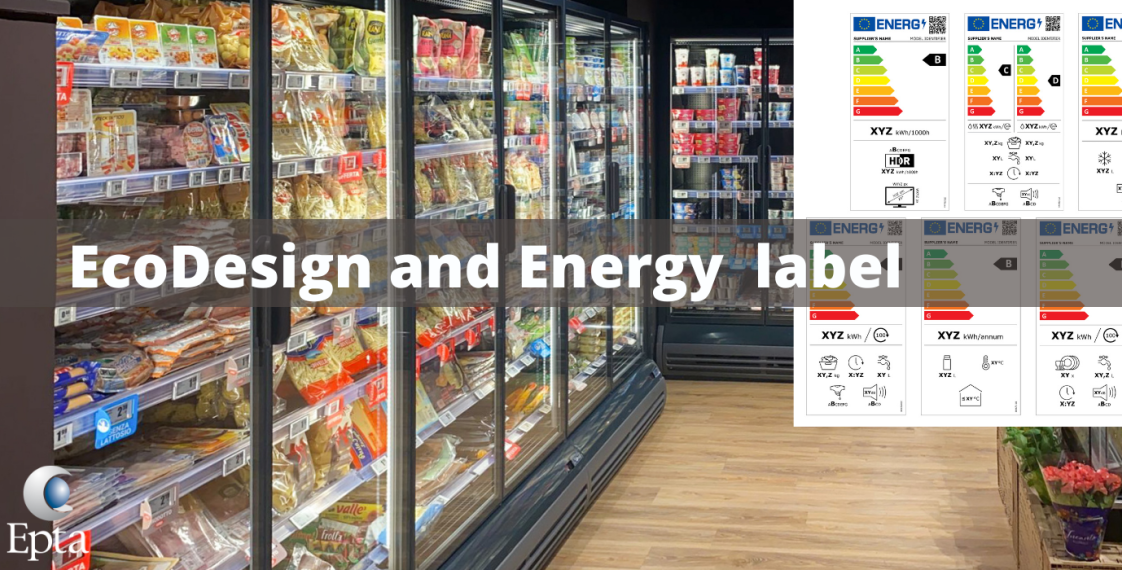EcoDesingn and Energy label

On December, 5th, 2019, the Ecodesign (2019/2024) and Energy Labeling Regulation (2019/2018) for Refrigerating appliances with a direct sales function were published in the Official Journal of the European Union and will enter into force starting from March, 1st, 2021.
The Ecodesign energy classification creates a selection of products according to their energy performance. Commercial refrigeration products will be chosen by the Client for their lower energy consumption: this will be the main driver of innovation. Ecodesign sets the minimum energy efficiency requirements, Energy Labelling highlights it.
The end user can finally compare products that apparently look identical but have very different energy and functional performances. Manufacturers on the other hand have a tool to prove that their products perform better than their competitors, and globally there is an increase in the average efficiency of the products sold in the European market.
But which products are the refrigeration appliances with direct sales function exactly? And will all the refrigeration cabinets actually be labeled or just some? And finally, what about "special" cabinets or custom-made products?
The Regulations clarify the scope of application and hence the products that will be labeled very precisely.
Refrigerating appliance with a direct sales function is an insulated cabinet with one or more compartments that are controlled at specific temperatures, cooled by natural or forced convection through one or more energy consuming means and intended for displaying and selling with or without assisted serving, foodstuffs and other non-food items at specified temperatures below the ambient temperature, accessible directly through open sides and/or through one or more doors or drawers.
In the Regulations these products are generally referred to as Lot 12, i.e. supermarket refrigerating (freezer or refrigerator) cabinets, self-contained plug-in cabinets, beverage coolers, small ice-cream freezers, gelato-scooping cabinets and refrigerated vending machines.
The refrigerated cabinets in our product catalog excluded from energy labeling are:
- refrigerating appliances with a direct sales function for the sale and display of live foodstuffs, such as living fish and shellfish, refrigerated aquaria and water tanks;
- saladettes, i.e. refrigerating appliances with one or more doors or drawer fronts into which temporary storage bins can be inserted for easy-access storage of foodstuffs such as pizza toppings or salad items;
- horizontal serve-over counters with integrated refrigerated storage of at least 100 litres per meter length, designed to work at chilled operating temperatures;
- corner cabinets;
- vending machines that are designed to work at frozen operating temperatures;
- serve-over fish counters with flaked ice;
- professional refrigerated storage cabinets, blast cabinets, condensing units and process chillers as defined in Regulation (EU) 2015/1095;
- wine storage appliances and minibars.
The so-called special cabinets, with strong customization for a customer, the prototypes and the so-called pilot projects, of which it is unknown if they will be repeated or not, are also subject to labeling if they are placed on the market and sold.
“Even if I only do one? …. YES!!”
Refrigerating appliances with a direct sales function that are displayed at trade fairs must bear the energy label if the first unit of the model has already been placed on the market or is placed on the market at the trade fair.
Besides, internet sales platforms are responsible for enabling the displaying of the label provided by the supplier and the product information in proximity to the price.
As you can easily understand the effectiveness of this energy measure directly depends on its coverage, and it is therefore essential that all products sold in the European market are labeled.
In fact, measures from the ecodesign applied to refrigerating appliances with a direct sales function will give an estimated 48 TWh of annual final energy savings in 2030, which can be further improved significantly by the energy labelling measure, an important contribution to the Green Deal goals which will make Europe the first climatically neutral continent in the world.